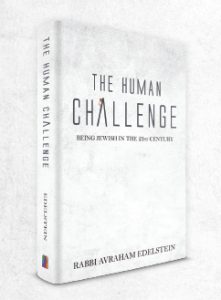
Olami Resources is happy to present a series of free installments featuring Rabbi Avraham Edelstein’s important new book, The Human Challenge. This week we are sharing the third essay from Section One – A Purposeful Life – entitled, Journey and Destination.
___________________
Man attains his unique identity when, after having been
enlightened by G-d that he is not only a committed
but also a free person, endowed with power to implement
his commitment, he grasps the incommensurability
of what he is and what he is destined to be.
Rabbi J. B. Soloveitchik [1]
Can we understand G-d’s mind? Can we know what He was thinking when He created the world? Let’s take a step back for a moment. If freedom and meaning are intertwined with connection to G-d, why would G-d create us on earth, a place so far removed from Him? The ways of G-d are further compounded when considering His essence. G-d is perfect. [2] He lacks
nothing. Why should G-d create us at all? What benefit could G-d receive by creating man? The very notion of us, mere mortals, serving as beneficial to G-d would undermine G-d’s perfection by implying that He needs something.
We can solve this dilemma by understanding the parameters of G-d’s perfection. Part of G-d’s perfection is that He is “perfectly” good. [3] This trait of perfect goodness lends itself to the desire of sharing that goodness with others, for, “It is the law of the good to do good.” [4] Hence, a perfectly good G-d who lacks nothing must have created man for man’s benefit of receiving G-d’s goodness. [5] However, since G-d is not only good, but perfectly good, this will not suffice. G-d’s perfect goodness dictates that He does the maximum good possible, and this implies that He should create man to share as many of His attributes as possible. This would make man as close to G-d as he could be. [6]
But there was a catch to this idea. For there is one attribute that appears to be non-transferable.
G-d is a “bestower” of good — an active creator of good. Man is a passive recipient of that good. How can man possibly share this attribute of G-d’s goodness if man’s very creation and existence is the receiving of good? This creates a tension. For without the sharing of this attribute, there would be a fundamental difference between man and G-d, a vast chasm that would appear to be unbridgeable. This would implicate that G-d’s giving is restricted; like a classic catch-22, His very giving transforms His creation into a limited receiver.
[1] “Confrontation,” in Tradition, Vol. 6, No. 2.
[2] Ramchal, Derech Hashem 1:1:6.
[3] Hence, the Torah, which is a revelation of G-d’s will, begins with kindness, ends with kindness, and its middle is kindness; Tanchuma, Parashat Vayeira 64.
[4] Ramchal, Daat Tevunot 18.
[5] Ibid. See also Derech Hashem 1:2:1.
[6] Derech Hashem ad loc.
Continue reading Journey and Destination.
Read the previous essay, Freedom.
Purchase a copy of The Human Challenge.
Rabbi Avraham Edelstein serves as the Education Director of Neve Yerushalayim College for Women and a senior advisor to Olami. Many of Rabbi Edelstein’s foundational publications addressing the world of Kiruv appear on OlamiResources.com.



















